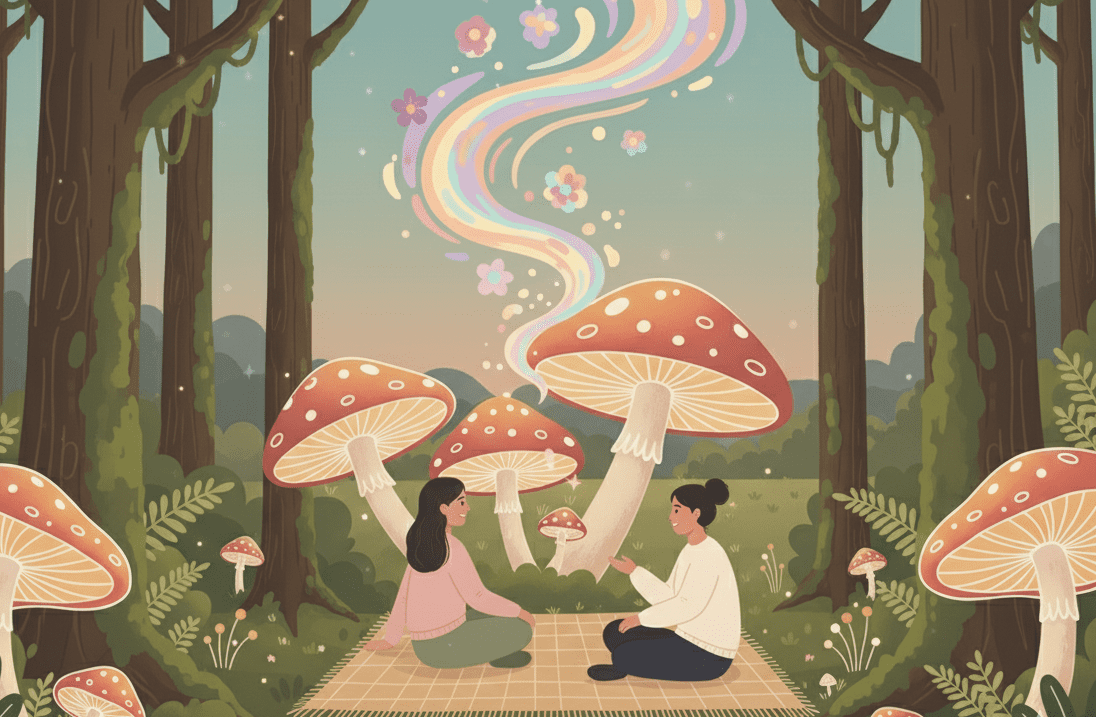Psychedelic retreats have captivated mainstream culture as places where anyone can work on themselves in a deep and personal way. Some people are fully bought in. Others are curious. Whichever camp you fall into, know that researchers are consistently churning out new research on psychedelics, much of which showcases the efficacy and safety of these compounds.
But our data shows that the quality of the experience one has at a retreat is crucial to the long-term effects of it, with a deeper, expert-led experience yielding a greater clinical improvement, according to Robin Carhart-Harris of Imperial College of London.
The goal of this article is to demystify psychedelic retreats, specifically a psilocybin retreat, by taking you through all the steps you’ll experience from signing up for the retreat itself to the post-experience work.
About the Author
Jayne Ebner facilitates yoga and breathwork for Beckley Retreats, helping guests ground themselves and feel present in the moment. Jayne earned her 20-hour yoga teacher training with Kula Yoga Project in 2015, and is also trained in Conscious Embodiment, Breathwork, and Yoga with teachers such as David Elliott, Erin Telford, Zach Dacuk, Maty Ezraty, and Genny Kapuler.
The Retreat Experience
A retreat is more than a physical space to take magic mushrooms (which contain psilocybin) with other like-minded people. It is (or at least should be) a thoughtfully designed process that cultivates transformation through pre- and post-retreat preparation in addition to the journey itself.
When it comes to psilocybin retreats, you may hear people talk about set and setting. These two elements are the foundation of the experience.
- “Set” refers to your mindset going in; your intentions, your emotional state, and the trust you’ve built with those supporting you. Your preparation sets your intentions, and your environment encourages you to slow down and tune in.
- “Setting” is the environment itself: the physical space and the atmosphere created around you, which becomes part of the transformation.
The Beckley Experience: Our psilocybin retreats take place on Jamaica’s expansive hillsides and the Netherlands’ rural countryside. Every detail of our retreats is designed to support the journey: comfortable surroundings, calming music, and nature close at hand, all facilitated by experienced staff who ensure your safety without being intrusive.
Why People Choose Psilocybin Retreats
People pursue psilocybin retreats for many reasons: healing from past experiences, navigating grief, seeking clarity in life transitions, and pursuing spiritual connection. A retreat model makes room for all of these intentions, and participants are often encouraged to share their reasons for partaking to create a feeling of openness and trust among the group.
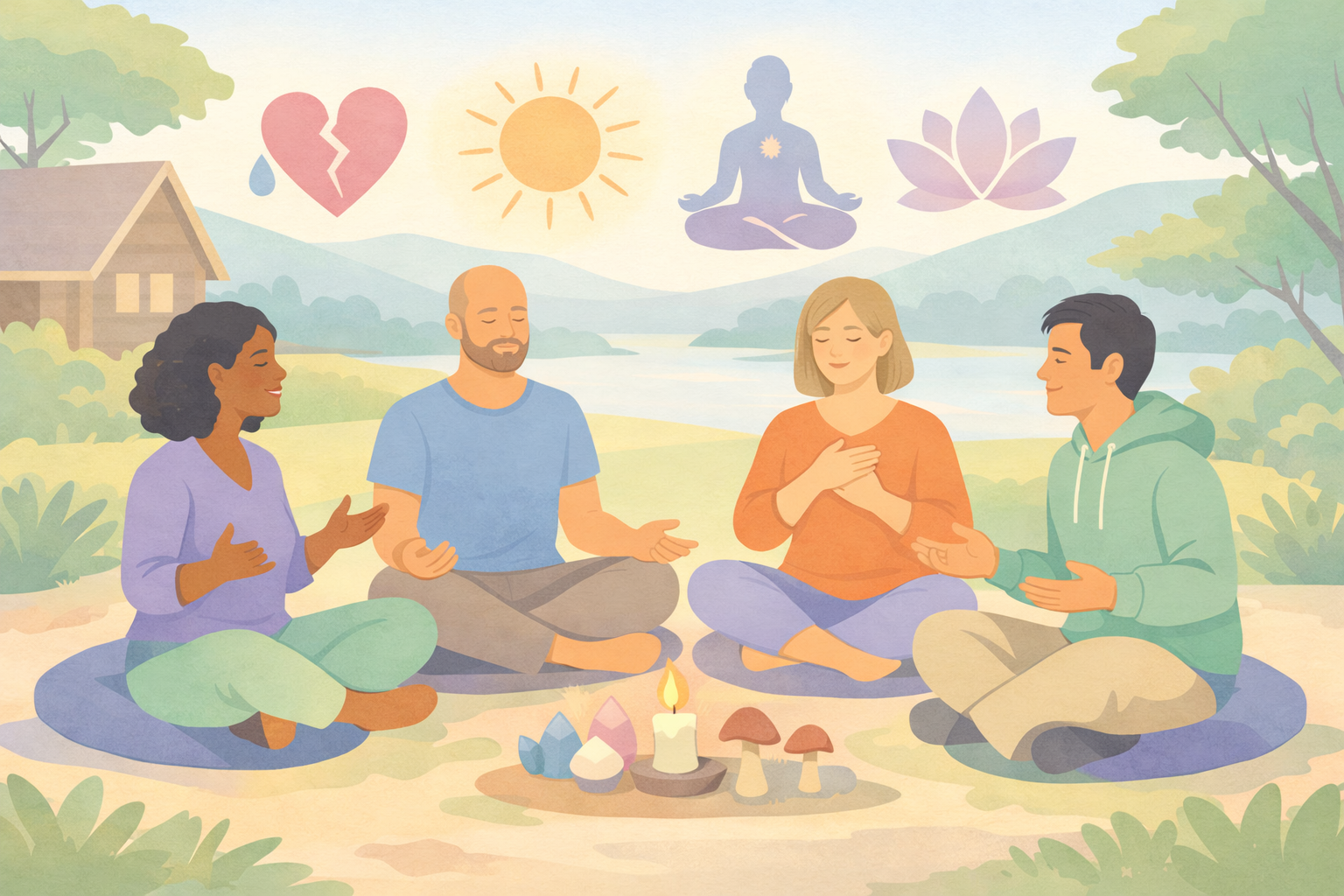
Whatever reasons folks have for attending a retreat, the experience can be a profound one. According to Roland R Griffiths of Johns Hopkins University, 58 percent of volunteers rated their psilocybin session among the five most personally meaningful—and 67 percent among the five most spiritually significant—events of their lives.
Who Retreats Aren’t For
A psilocybin retreat isn’t a fit for everyone. Those with certain health conditions or taking specific medications can’t participate safely. Sometimes, the timing doesn’t align with where a person is in their life, and they’d be better off waiting until they feel more grounded. Here’s a quick list of medical conditions that would eliminate someone from the process:
- Diagnosed psychosis, schizophrenia, bipolar, or borderline personality disorders
- Severe anxiety or depression
- Suicidal thoughts or tendencies
- Certain cardiovascular conditions, such as coronary artery disease, a history of heart attack or stroke, or uncontrolled/severe high blood pressure
- Certain kidney or liver disorders
- Pregnancy or breastfeeding
- Anyone actively taking lithium
Safety First: Screening, Set & Setting
One significant benefit of attending a legitimate retreat is the built-in layer of safety: Before each retreat, participants complete a medical and mental health screening to ensure the experience and location are a good fit.
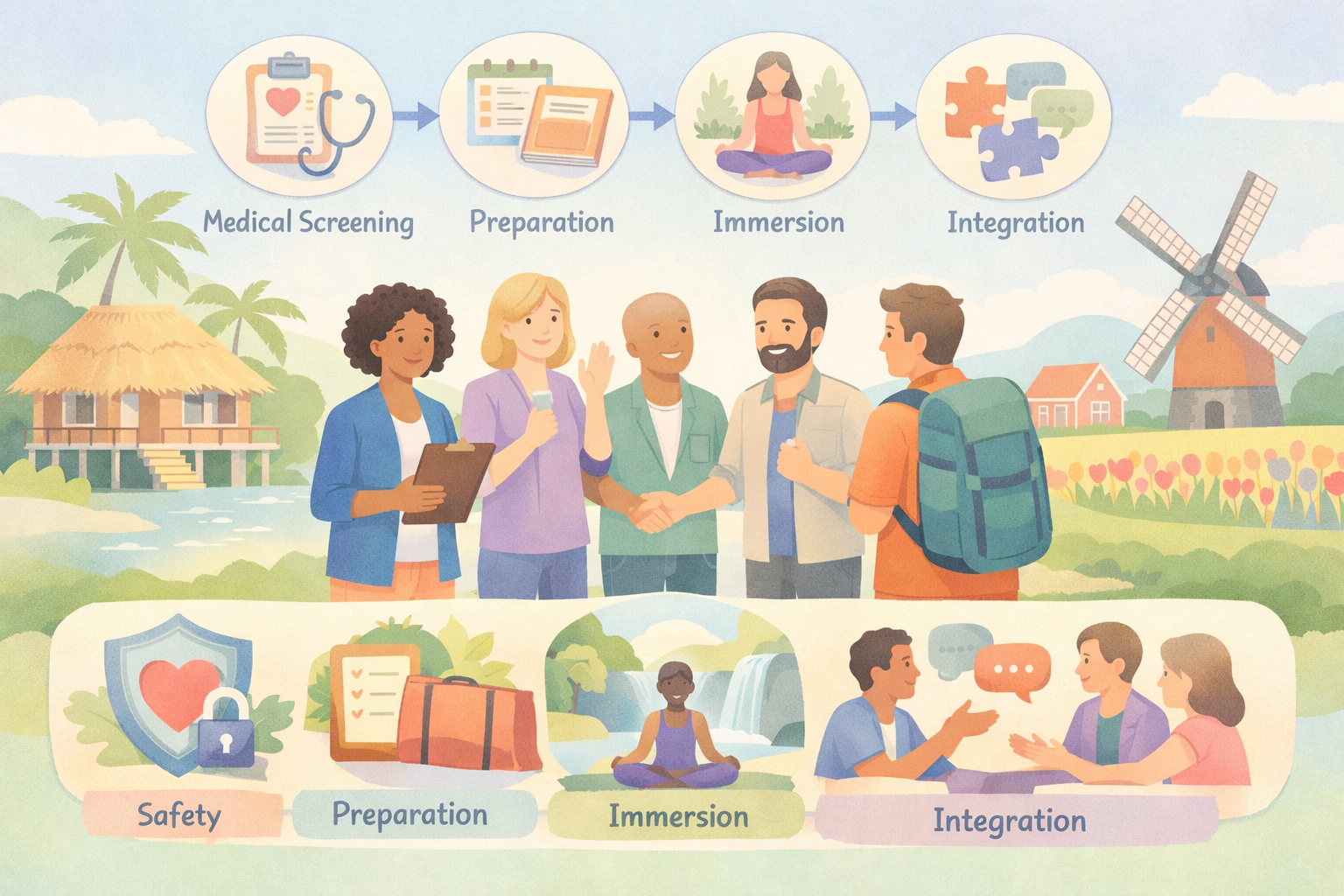
There are two primary criteria that define a suitable retreat setting. First, it needs to occur in a location with a legal framework for obtaining and consuming psilocybin. Currently, that’s in Jamaica and the Netherlands. Second, the setting must be physically suitable. Being in nature, staying in comfortable accommodations, and being served thoughtful nutrition throughout the week create a comfortable environment for the transformation process to take place.
While staff can differ based on the company, Beckley’s retreats are staffed with experienced facilitator teams that bring diverse backgrounds, whether in ceremony, psychotherapy, music, medicine, or breathwork. Together, their perspectives create a strong and supportive container, guiding participants through the complete three-phase journey of a retreat: preparation, immersion, and integration. Participants will have a chance to become familiar with their facilitator team at various points before the retreat.
Beckley’s Three-Phase Journey
Let’s be transparent: While a psilocybin experience can be beautiful, for people it can be a scary or unfulfilling journey. That’s why we emphasize the three key components of our process: preparation, immersion, and integration. Here’s what you can expect once you begin the process
1. Preparation
You’ll begin to plant seeds for a meaningful and productive experience four weeks before the ceremony. During this time, you’ll be guided through travel planning and creating space in your life, whether that means stepping away from work, family, or other commitments. You’ll connect with Beckley staff and your facilitator team, who will send you preparation materials to explore at your own pace. To support you, we’ve designed a few touchpoints:
- A one-on-one call with a facilitator: This is your chance to ask questions—as many as you’d like—and uncover your intentions.
- Two group preparation calls: Use this time to build connections with fellow retreat attendees.
- Preparatory materials: These include writing prompts, meditations, and self-regulation practices. We encourage you to dive in as they offer a powerful way to deepen your self-knowledge and arrive feeling grounded.
2. Immersion
Immersion is the on-site experience. Participants arrive in the retreat setting, chosen for its beauty and comfort, and quickly partake in a schedule of guided activities balanced with free time for rest and reflection.
Arrival Day
Upon arrival, you’ll settle into your room and, depending on when you arrive, explore the grounds at your own pace. The retreat begins with an opening gathering, where you’ll meet your fellow participants and facilitators in person for the first time. Afterwards, you’ll share a prepared dinner, made by the retreat center staff.
Ceremony Days
Ceremony days include optional morning movement and meditation, facilitator check-ins to determine your particular dosage, a preparatory breathwork session, and personal time to rest, journal, and connect with nature.
Integration Days
After each ceremony, you’ll dedicate a full day to integration, including morning movement and meditation, nourishing meals, and sessions with the team. There may also be opportunities for massage, extended time in nature, or resting on your own, whatever supports your restoration.
The Psilocybin Ceremony
A term you’ll read and hear a lot when researching psychedelic experience is “container”. It refers to the set (your mindset), setting (you environment), support (the staff), and a respect for the boundaries and protocols put into place. It’s important to know because your ceremonial container is crucial to holding your experience together (hence the name). Facilitators shape this container by attending to practical details like airflow, lighting, and comfort, while also bringing in ceremonial elements such as music, sound, or ritual to deepen the atmosphere.
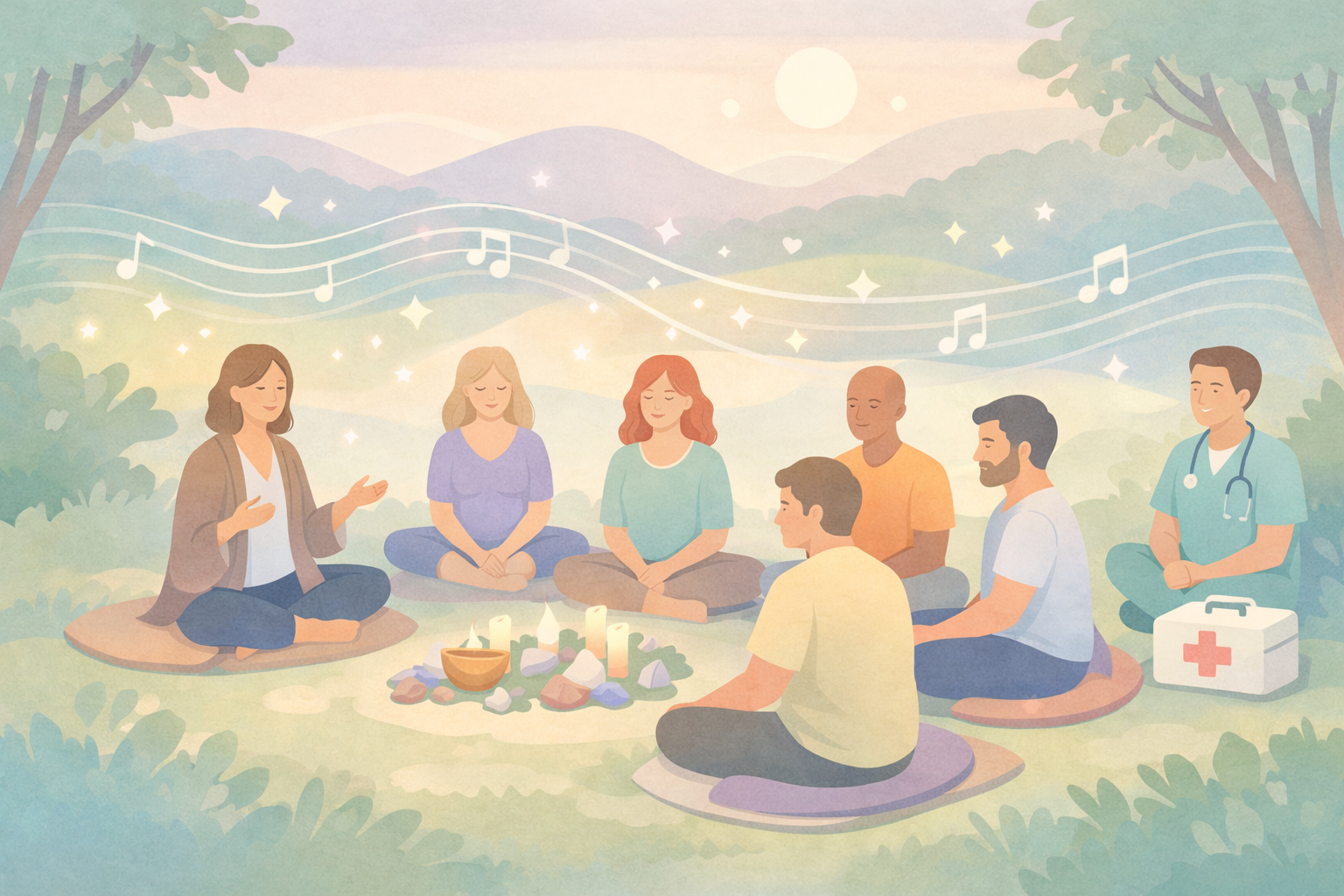
Expect the ceremony to last around five hours. The psilocybin should kick in within 30 minutes to an hour, with the effects peaking between hours two and three. The group begins together and ends together, and participants are supported if they need to make a trip to the bathroom, or a moment outside of the ceremonial circle for any reason. Retreats do have medical professionals on site or nearby, ensuring that support is available if it’s ever required.
If you’re new to psychedelics, you’re probably most curious about what it feels like to take psilocybin. Every journey is unique and it’s hard to articulate the experience, but people describe feelings of clarity, awe, deep connection, emotional release, and joy. The experience can sometimes feel dreamlike. Your senses become heightened—images are more vivid, music sounds deep and full. Mentally, psilocybin may increase your ability to hold multiple truths at once, offering fresh perspectives and insights.
3. Integration
The retreat may mark the peak of the psilocybin experience, but its impact extends far beyond those days.
Research shows that psilocybin can increase neuroplasticity—the brain’s ability to form new connections and patterns—which means the weeks following a retreat are a uniquely fertile time for growth and change. Integration supports the transition back into daily life, helping anchor insights and turn them into lasting shifts. To help the process, participants are equipped with:
- Four group integration calls with facilitators and fellow participants.
- Integration materials such as writing prompts, guided meditations, and breathwork practices.
- Optional ongoing group connection with the retreat community.
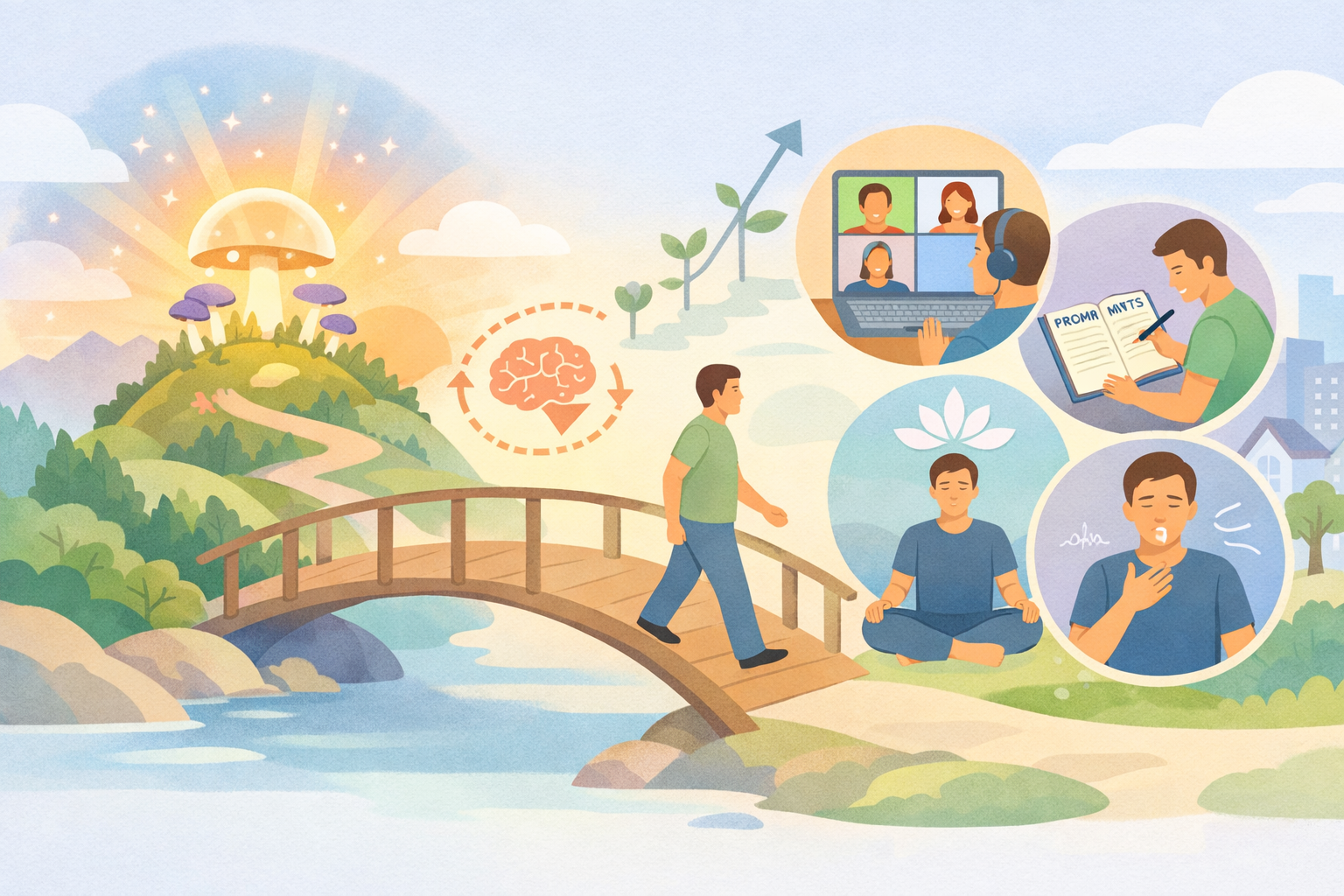
Through these supports, integration becomes the bridge between ceremony and everyday life; helping participants turn insights into action and inspiration into meaningful, sustainable change.
In Conclusion
Ultimately, you can’t perfectly predict the outcomes of a psilocybin retreat. You may arrive with intentions, seeking healing, clarity, or inspiration, and while those can serve as a compass, the real value often lies in the unexpected turns the journey takes.
The retreat container itself is what makes this possible. A safe, intentional space, dedicated time, and supportive staff enable the experience to unfold naturally and help capture the essential shifts that might otherwise be missed in everyday life.
If you’re feeling curious about whether a retreat might be right for you, start by reflecting on your intentions and readiness. The journey begins long before the ceremony itself. Taking time to listen inward is the first step toward knowing if this path is for you.
Frequently Asked Questions
Yes, but only in specific countries: Beckley offers retreats in Jamaica and the Netherlands. Choosing a retreat program in a legal location can help alleviate any concerns about legal repercussions.
Participants are given a comfortable personal mattress to lie down on. Folks are set up in a circle and facilitators are in the room, playing ceremonial music, seated or accompanying individual participants who may need to use the bathroom or take time outside the circle for any reason.
Some people worry about ‘losing control’ during a ceremony. You will remain aware of your surroundings and retain normal physiological functions like standing, walking, speaking, and using the bathroom. You may experience hallucinations, and colors and sounds are often more vivid, but you will be aware that you are experiencing all of these sensations. Facilitators are present throughout to provide support, helping you feel safe and confident throughout the experience.
Dosage is determined by each person’s constitution, tolerance to other substances, and comfort level with the experience. Guests are consulted and experienced facilitators will gauge the dosage level accordingly.
Sources
- Griffiths, R. R., Richards, W. A., Johnson, M. W., McCann, U., & Jesse, R. (2008). Mystical-type experiences occasioned by psilocybin mediate the attribution of personal meaning and spiritual significance 14 months later. Journal of Psychopharmacology, 22(6), 621–632. https://doi.org/10.1177/0269881108094300
- Daws, R. E., Timmermann, C., Giribaldi, B., et al. (2022). Increased global integration in the brain after psilocybin therapy for depression. Nature Medicine, 28(4), 844–851. https://doi.org/10.1038/s41591-022-01744-z
Psychedelic Retreats• Personal Transformation• Beckley Retreats• Integration Practices• guided psilocybin ceremony

Jayne Ebner
-2-1.png)
